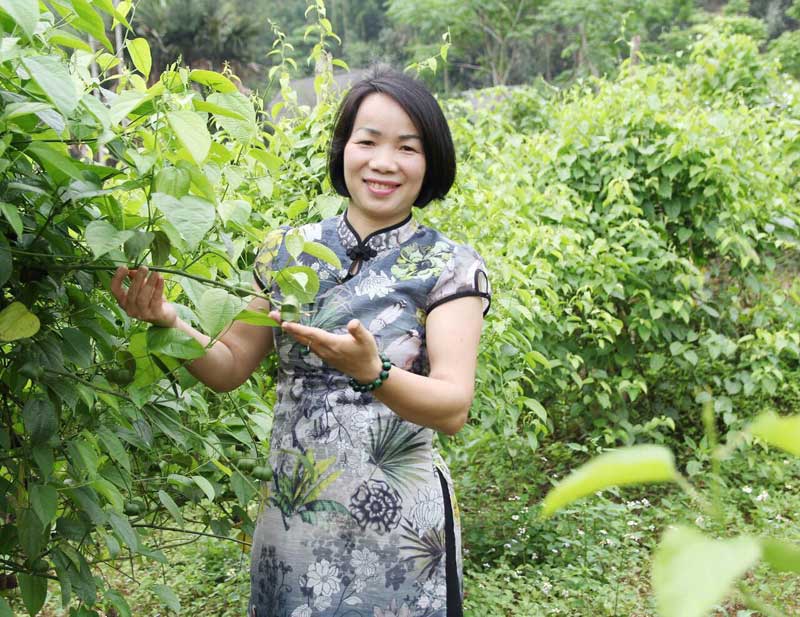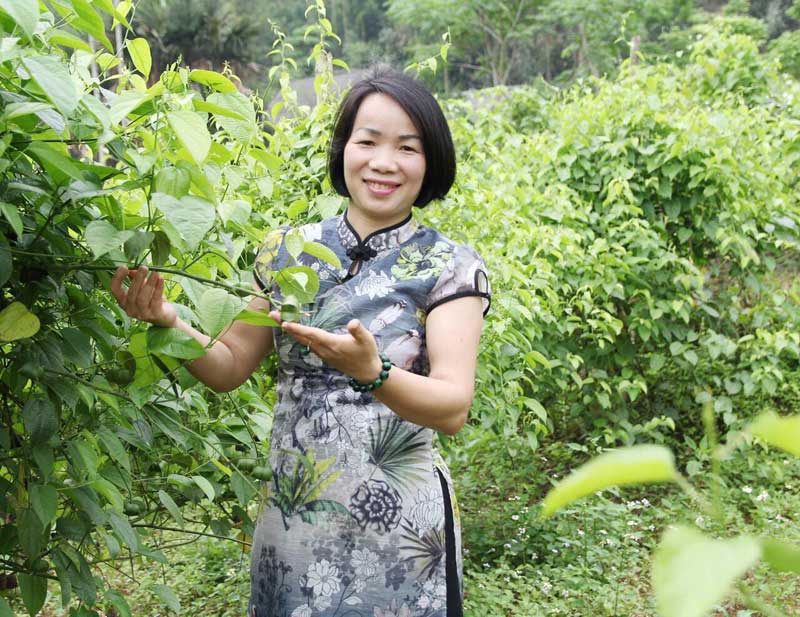
(HBO) – While having a happy, calm, stable but not rich life as a teacher, always being a strong rear for her husband, Ms. Le Thi Van (addressed at No. 89B, Bui Thi Xuan street, Group 24, Huu Nghi Ward, Hoa Binh city) suddenly took on a completely new job to "no roses" road, that is to become a businesswoman. Since then, she determined to face with the challenges in the market.

According to the study, the Sachi (Sacha
Inchi) plant is originated in the Amazon forest, where indigenous INCA people
have used for thousands of years as a health and longevity food supplement.
Sachi is currently being grown in some Southeast Asian countries such as
Thailand, Malaysia, Cambodia, etc. In Vietnam, Inca Vietnam joint Stock Company
being operated by Ms. Le Thi Van is the first company to conduct planting
trials and mass commercialization of Sachi trees.
Recalling the failure of planting Sachi
plants in Da Bac upland, Ms. Van said that it was due to the lack of experience
and doing, vice versa, she found out, analyzed the cause and inadequate
problems to overcome. Throughout the year of 2016, she coordinated with
Associate Professor Tram to study, formulate the process of developing raw
materials area. Along with that, she travels throughout the districts, cities
in the province, including the surrounding provinces to promote, advocate, and
find growers. However, she did not continue planting in the failed area.
Thanks to her passion and enthusiasm, up to
now, Sachi material plantation area has been expanded to 10 out of 11 districts
and city (excluding Lac Thuy district) with an area of 50 hectares inside and
50 hectares outside the province. Although the plantation is in the model
stage, Sachi trees have initially created trust for farmers by bringing in
stable income and output. The Company contracts with household groups and
organizes the purchase of all raw materials of the farmers with 10-year
contracts. Not only did the Company harvest Sachi fruit like other businesses,
but it also bought leaves for growers. "Seeing is better than
hearing", when the actual results are clear, the reliability of the
growers for the business is improved. The Sachi growers feel more believable
that they can get the long-term income from Sachi plantation, because the
plantation circle of Sachi trees is about ten years, they do not worry about
the output, and the income is 3-5 times higher than growing corn and rice.
According to data from the Hoa Binh Provincial Party Committee, the industrial production index for the first six months of 2025 is estimated to have increased by 20% compared to the same period last year. This marks the highest year-on-year growth rate for this period since 2020.
In the first six months of 2025, Hoa Binh province’s export turnover was estimated at 1.145 billion USD, marking an 18.11% increase compared to the same period in 2024. Import turnover was estimated at $ 804 million, a 17.15% increase, which helped the province maintain a positive trade balance.
The lives of the ethnic minority farmers in Tan Lac district have gradually improved thanks to the new directions in agricultural production. This is a testament to the collective strength fostered through the professional associations and groups implemented by various levels of the district’s Farmers’ Union.
With the motto the "product quality comes first,” after nearly one year of establishment and operation, Muong village’s Clean Food Agricultural and Commercial Cooperative, located in Cau Hamlet, Hung Son Commune (Kim Boi district), has launched reputable, high-quality agricultural products to the market that are well-received by consumers. The products such as Muong village’s pork sausage, salt-cured chicken, and salt-cured pork hocks have gradually carved out a place in the market and they are on the path to obtaining the OCOP certification.
In the past, the phrase "bumper harvest, rock-bottom prices" was a familiar refrain for Vietnamese farmers engaged in fragmented, small-scale agriculture. But today, a new spirit is emerging across rural areas of Hoa Binh province - one of collaboration, organisation, and collective economic models that provide a stable foundation for production.
Maintaining growing area codes and packing facility codes in accordance with regulations is a mandatory requirement for agricultural products to be eligible for export. Recently, the Department of Agriculture and Environment of Hoa Binh province has intensified technical supervision of designated farming areas and packing facilities to safeguard the "green passport" that enables its products to access international markets.



